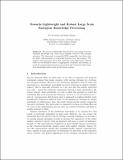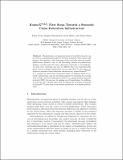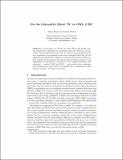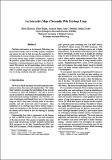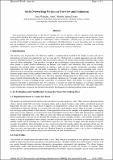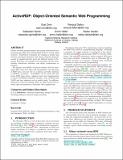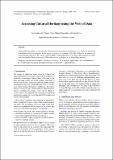Search
Now showing items 31-39 of 39
Towards Lightweight and Robust Large Scale Emergent Knowledge Processing
(Springer, 2009)
We present a lightweight framework for processing uncertain
emergent knowledge that comes from multiple resources with varying
relevance. The framework is essentially RDF-compatible, but allows also
for direct representation ...
KonneXSALT: First Steps Towards a Semantic Claim Federation Infrastructure
(Springer, 2008)
Dissemination, an important phase of scientific research, can be seen as a communication process between scientists. They expose and support their findings, while discussing claims stated in related scientific publications. ...
On the Ostensibly Silent 'W' in OWL 2 RL
(Springer, 2009)
In this paper, we discuss the draft OWL 2 RL proable from the perspective of applying the constituent rules over Web data. In particular, borrowing from previous work, we discuss (i) optimisations based on a separation ...
An Interactive Map of Semantic Web Ontology Usage
(IEEE, 2008)
Publishing information on the Semantic Web using common formats enables data to be linked together, integrated and reused. In order to fully leverage the potential for interlinking data by reusing existing schemas, an ...
Social Networking Portals: An Overview and Evaluation
(2004)
Next generation communication on the Internet changes the way we interact with the complexity of the information load on the World Wide Web. Web portals act as gateways to resources and a multitude of services on the ...
2LIP: Filling the Gap between the Current and the Three-Dimensional Web
(2009)
In this article we present a novel approach, the 2-Layer Interface Paradigm (2LIP), for designing simple yet interactive 3D web applications, an attempt to marry advantages of 3D experience with the advantages of the ...
ActiveRDF: Object-oriented semantic web programming
(Association for Computing Machinery, 2007)
Object-oriented programming is the current mainstream programming paradigm but existing RDF APIs are mostly triple-oriented. Traditional techniques for bridging a similar gap between relational databases and object-oriented ...
Accessing Cultural Heritage using the Web of Data
(2009)
Cultural Heritage (CH) is a vast domain, where sharing information is challenging. As a result, the global CH is distributed and heterogeneous. In this paper, we present the concept of the Web of Data as an approach to ...
Simple algorithms for predicate suggestions using similarity and co-occurrence
(Association for Computing Machinery, 2007)
When creating Semantic Web data, users have to make a critical choice for a vocabulary: only through shared vocabularies can meaning be established. A centralised policy prevents terminology divergence but would restrict ...

